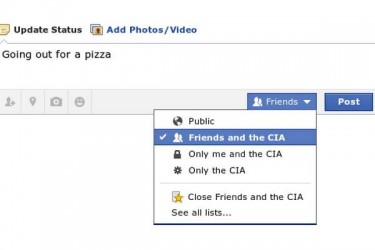Critical voices have been raised in the European Union since Edward Snowden recently revealed the existence of North American secret service program, PRISM.
PRISM is a program that allows certain U.S. organizations, like the NSA (National Security Agency) or the FBI (Federal Bureau of Intelligence), to access the communications of any citizen in the world without a court order and has received alleged help from [es] Microsoft, Google, Yahoo, Facebook, AOL, Apple, and Paltalk. The U.S. government has justified it as an excuse for the fight against international terrorism. Keith Alexander, General Director of the NSA affirmed that PRISM has “prevented dozens of terrorist attacks” [es] although he did not provide any more details on these supposed attacks.
In the name of protecting the privacy of its citizens, the EU has imposed a sanction on Google [es] in February 2013 for refusing to modify its privacy policies to adapt to the strict European legislation [es]. In the European Parliament, they are also studying means that guarantee web neutrality, proposed by Vice President of the European Commission, Neelie Kroes from Holland, who stated the following according to eldiario.es [es],
[prohibirán] la interferencia en el tráfico de datos a las operadoras (ISP) y que [obligarán a que] las escuchas e interceptación solo sean posible tras orden judicial.
[they will prohibit] operator (ISP) interference in data traffic and will [make it so that] the wire tapping and interceptions be possible only by court order.
It is important to point out Articles 7 and 8 from the Charter of Fundamental Rights of the EU [es]:
Artículo 7
Respeto de la vida privada y familiar
Toda persona tiene derecho al respeto de su vida privada y familiar, de su domicilio y de sus comunicaciones.
Artículo 8
Protección de datos de carácter personal
- Toda persona tiene derecho a la protección de los datos de carácter personal que le conciernan.
- Estos datos se tratarán de modo leal, para fines concretos y sobre la base del consentimiento de la persona afectada o en virtud de otro fundamento legítimo previsto por la ley. (…)
Article 7
Respect for private and family life
Every person has the right to respect for his or her private and family life, home, and communications.
Article 8
Protection of personal data
- Every person has the right to protection of personal data that concerns him or her.
- This data will be processed fairly, for specified purposes and on the basis of the consent of the person affected or another legitimate basis laid out by the law. (…)
A question that would open a wide parallel debate also arises: the possibility that PRISM has helped the U.S. obtain trade secrets from companies that could have competed with North American corporations.
On June 11, a few hours after Snowden leaked the information, the European Parliament debated this issue. The MEPs harshly criticized the United States program [es]. According to Sophie in’t Veld, a liberal Dutch MEP:
Estamos fallando a los ciudadanos europeos y deberíamos avergonzarnos
We are failing the European citizens and we should be ashamed of ourselves
Green German MEP Jan Philipp Albrecht criticized the U.S. in these words:
No se trata sólo de un problema de protección de datos, sino también de la democracia y del Estado de Derecho, que no son compatibles con la vigilancia masiva de los ciudadanos de todo el mundo.
It is not just about a data protection problem, but also about democracy and the rule of the law, which are not compatible with massive surveillance of citizens worldwide.
Jaroslav Paška, from the group Europe of Freedom and Democracy, declared:
el comportamiento paranoico de nuestros socios americanos es lamentable.
the paranoid behavior of our American partners is unfortunate.
Paška approaches the feeling of many Europeans whose countries have supported the scourge of terrorism for decades and have seen how their authorities successfully battled such a grave problem without having to resort to invading the privacy of their citizens. As setabense [es] said in his commentary on an article about PRISM in El País [es],
No me parece bien, que por lo cagaos que estan, espien todas las llamadas, con la escusa del terrorismo, estan violando la intimidad de la gente, seas o no seas terrorista.
It doesn't seem right to me that, as gutless as they are, they spy on all phone calls with the excuse of terrorism, they are violating peoples’ privacy, whether you are a terrorist or not.
On June 10, European Commission of Justice, Viviane Reding, sent a letter to the U.S. Attorney General demanding detailed information on the subject of PRISM, in which she noted the following, according to El País [es]:
Dada la gravedad de la situación y la seria preocupación que ha expresado la opinión pública a este lado del Atlántico, entenderá usted que espere respuestas rápidas y concretas el viernes. La Comisión Europea rinde cuentas ante el Parlamento Europeo, que probablemente evaluará toda la relación transatlántica a la luz de sus respuestas.
Given the gravity of the situation and the serious concern that the public opinion on this side of the Atlantic has expressed, surely you understand that prompt and concrete answers await this Friday. The European Commission is accountable to the European Parliament, which will probably evaluate the entire transatlantic relationship in light of your answers.
The commissioner is referring to the free trade agreement, which is being debated between both parties, and to the cooperation agreements in effect which benefit the U.S. above all: for example, the countries in the EU deliver information about capital movement and air travelers to the U.S., information that is not shared between the states of the European Union itself.
Not long after the annual bilateral meeting between the U.S. and the EU which took place in Dublin on Friday, June 14, Commissioner Reding wrote on her Twitter account:
@VivianeRedingEU: The concept of national security does not mean that “anything goes”: States do not enjoy an unlimited right of secret surveillance. #PRISM
To which user Silviu responded:
@SinedioMD: @VivianeRedingEU Oh, of course they do and I don't believe anyone that tells me otherwise. Also, the US actions are an act of war.
At the press conference following the meeting, Commissioner Reding said:
PRISM is targeted at non-U.S. citizens under investigation on suspicion of terrorism and cybercrimes. (…) It is on the basis of a court order, of an American court, and of congressional oversight.
(…) convene, in the short-term, a meeting of security experts from the U.S. and from the EU in order to clarify together the remaining matters (…)
This descent in tone leaves European citizens doubting which criteria the U.S. government uses to “recognize” a terrorist or what it does with the useless data it obtains. While this is being resolved, this page contains a list of alternative services to those that collaborate with PRISM that respect user privacy.










1 comment